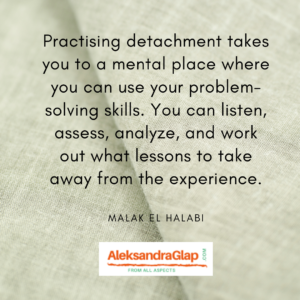Negativity
In one of my recent conversations, we discussed with someone his problems with colleagues who show anger and frustration to that person, accusing him of an unequal distribution of responsibilities. After a closer look at the problem, it turned out that these people are projecting their own personal struggle with the poor sense of value and lack of acceptance they have experienced in the past, either in their professional lives or in their relationships. Failure to deal with the demons of the past causes that even a neutral message sent to a person is perceived as a criticism and triggers a defensive reaction, i.e. a verbal attack – offensive words are spoken, threats are sent.

How to manage the impact of those negative emotions passing to you from your surrounding?
Do not identify yourself with negative reactions from others.
We must become aware of the probable cause of these reactions that belongs to other people and not to ourselves. It will be easier to defend ourselves against someone’s criticism or frustration, knowing that we are not the cause, but the unresolved problems of that person are. Equipped with such awareness, we will be able to mentally cut ourselves off from the influence of negative emotions transmitted by others. We may also repel similar `attacks` in the future by preparing a statement ready to be uttered in thought (or even aloud, depending on the context) expressing our assessment of a difficult situation. For example, considering `It is the problems with her partner that cause her aversion to me` and will allow us not to personally accept someone else’s unpleasant commentary.

Show understanding and compassion for the suffering
Understanding the real motives behind someone’s behaviour is the first step to not feel touched by someone’s emotions. The next step is an attitude of compassion that changes our approach to a person with problematic behaviour and evokes positive feelings, warmth and calmness, and the desire to support someone in need, that is to say, the flow of internal energy rather than weakening it. This mindset means that we take control of our emotions and become stronger from the victim in a conflict situation.
Choose consciously the people you surround yourself with.
You have a choice about how to deal with negative people. You can decide not to engage with their negativity, you can ignore them, or you can just avoid them altogether. If you must have contact with a negative person at work, for example, be helpful but don’t engage with them. Otherwise, it’s up to you whether you want to have any contact with such negativity, or not. Where possible, reduce contact with toxic people. Focus on people in your life who are positive. As much as possible, get rid of, or limit contact with negative people. Sometimes you cannot completely do this, especially if they are family, but try to limit as much as you can.
Be aware of your environment
For most people, modern life means urban life and urban life means crowds, traffic, and noise. Historically, developmentally and genetically, we are not particularly adapted to the types of conditions that urban life typically offers. Stress and frustration explode into anger and, if not controlled, can result in one person committing acts of violence on another. We all have, in one form or another, experienced this type of situation. It could have occurred in rush hour traffic. It may just as easily have occurred in a line at the supermarket or an entertainment event. People are edgy and the sight of someone trying to unfairly advantage themselves can send negative emotions through the roof.

Don’t Over-react
The worst thing you can do is to have a knee-jerk reaction, whether it’s angrily defending yourself or turning the criticism back on them. That’s just creating conflict and won’t get you anywhere close to a resolution. It also ups the emotional ante and paves the way for a full-on argument. Now, letting the full force of your frustrated emotional response out may feel good at the time. However, you also must realize that no matter how emotionally good it makes you feel, it’s never appropriate and almost always a negative adaptability-wise. Think about it, the more you allow yourself to boil over and yell, rant, punch surfaces, etc., the more toll your behaviour is taking on your reputation and your relationships. Your immediate reaction to negative emotions is likely to be negative as well. Instead, take a breath (or three), pause, and reflect before you respond. Take another look at what another person is saying and see how you can understand their attitude differently once you’ve allowed some time for your initial emotions to dissipate.
Trying to calm down when you face someone`s angry or frustration certainly isn’t easy. However, with practice, it can be accomplished. In fact, allowing yourself to fly off the handle may actually be detrimental to your health. Research has shown that people who are unable to control their emotions are far more likely to suffer from depression and hypertension. So, not only do you gain a mental and social benefit from defeating negativity, but there is also a physical boost involved as well. In short, if you’re suffering from less than optimal health, the inner calm that comes from controlling your emotional responses may be just the thing you need to start feeling better.
Emotional awareness is something you may practise – knowing you’re influenced by somebody`s negative mood, knowing you’re downcast, angry, or sad… How would you rank your own emotional awareness in this area? Please, comment below.
Let me know and stay positive.
Aleksandra
